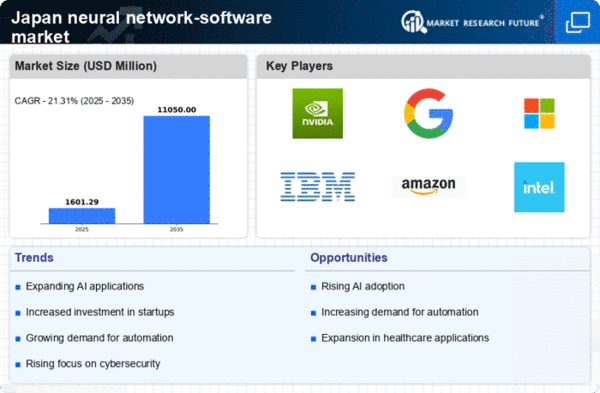Emergence of Edge Computing
The rise of edge computing in Japan presents new opportunities for the neural network-software market. As organizations seek to process data closer to the source, the demand for software solutions that can operate efficiently on edge devices is increasing. This trend is particularly relevant in industries such as automotive and manufacturing, where real-time data processing is crucial. The integration of neural networks with edge computing technologies allows for faster decision-making and improved operational efficiency. As a result, the neural network-software market is likely to see substantial growth, driven by the need for innovative solutions that can leverage edge computing capabilities.
Government Initiatives and Funding
The Japanese government actively promotes the development and adoption of artificial intelligence technologies, including neural networks. Various initiatives and funding programs are in place to support research and development in this field. For instance, the government allocated approximately ¥100 billion to AI-related projects in the recent fiscal year. This financial backing aims to foster innovation and encourage collaboration between private enterprises and research institutions. As a result, the neural network-software market is expected to expand, driven by increased investment in AI technologies and the subsequent development of advanced software solutions tailored to meet industry needs.
Rising Demand for Automation Solutions
The neural network-software market in Japan experiences a notable surge in demand for automation solutions across various sectors. Industries such as manufacturing, finance, and healthcare are increasingly adopting neural network technologies to enhance operational efficiency and reduce human error. According to recent data, the automation market in Japan is projected to grow at a CAGR of approximately 15% over the next five years. This trend indicates a strong inclination towards integrating advanced software solutions that leverage neural networks for predictive analytics and process optimization. As organizations seek to streamline their operations, the neural network-software market is likely to benefit significantly from this growing demand for automation.
Growing Data Availability and Accessibility
The proliferation of data generated by digital platforms and IoT devices in Japan significantly impacts the neural network-software market. With the increasing availability of large datasets, organizations are better positioned to train neural networks effectively. This trend is particularly evident in sectors such as retail and telecommunications, where data-driven decision-making is becoming the norm. Reports indicate that the volume of data generated in Japan is expected to reach 50 zettabytes by 2030. Consequently, the neural network-software market is likely to thrive as businesses leverage this data to develop sophisticated algorithms and enhance their analytical capabilities.
Shift Towards Personalized Customer Experiences
In Japan, there is a marked shift towards providing personalized customer experiences, which is driving the adoption of neural network technologies. Businesses are increasingly utilizing neural networks to analyze consumer behavior and preferences, enabling them to tailor products and services accordingly. This trend is particularly prominent in the e-commerce and retail sectors, where companies are investing in advanced software solutions to enhance customer engagement. The neural network-software market is expected to grow as organizations recognize the value of personalized marketing strategies, with projections indicating a potential increase in market size by 20% over the next few years.
















